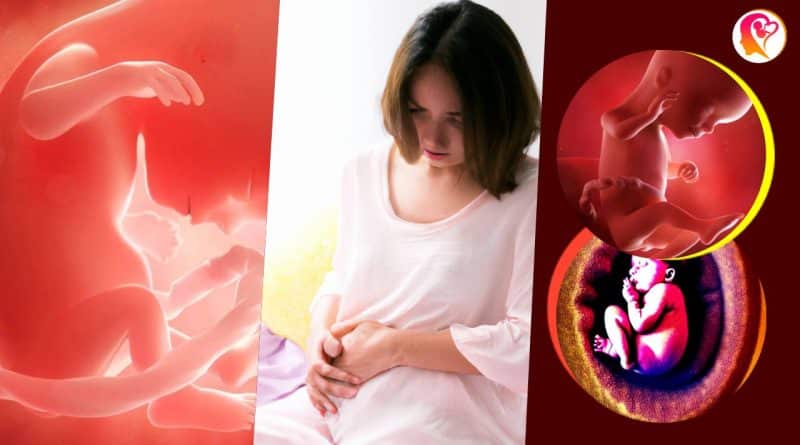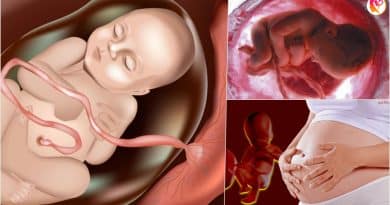14 Signs Of Baby In Womb Not Alright Or Developing
इस लेख को हिंदी में पढ़िए
Information on potential signs that a baby may not be developing or progressing normally in the womb.
Highlights of Article
Abdominal pain or cramping
Abdominal pain or cramping can be a sign of a problem with the baby, such as growth restriction or a birth defect, or a problem with the mother, such as pre-eclampsia or a uterine infection.
Vaginal bleeding or spotting
Vaginal bleeding or spotting can be caused by a number of things, including a miscarriage, an ectopic pregnancy, or a problem with the placenta.
Abnormal fetal growth
For instance babies that are either too small or too large for their gestational age, which could be an indication of issues related to nutrient flow from mother to fetus.
Reduced fetal movement or lack of fetal heartbeat
The baby should be moving and growing regularly throughout pregnancy, and the mother should be able to feel the baby move. If the baby’s movements slow down or stop, or if there is no fetal heartbeat on an ultrasound, it can be a sign of a problem.
Abnormal results on prenatal screening tests
Prenatal screening tests, such as an ultrasound or blood tests, can help identify potential problems with the baby’s development. For example, an abnormal nuchal translucency (NT) measurement on an ultrasound can indicate an increased risk of Down syndrome or other chromosomal abnormalities, while abnormal results on a serum screening test can indicate a higher risk of certain birth defects or genetic disorders.
A uterus that is smaller or larger than expected for the stage of pregnancy
If a uterus is smaller or larger than it should be for the stage of pregnancy, it can indicate a problem with the baby or the pregnancy, such as a miscarriage, a growth restriction, or a birth defect.
Amniotic fluid leakage or rupture of membranes
Leakage of amniotic fluid or rupture of the membranes that surround the baby in the uterus can indicate a problem with the baby or the pregnancy, such as a birth defect, a problem with the placenta, or a preterm labor.
High blood pressure or pre-eclampsia
High blood pressure or pre-eclampsia (a serious complication of pregnancy characterized by high blood pressure, protein in the urine, and fluid retention) can be caused by a number of things, including a problem with the baby or the placenta, a genetic disorder, or a problem with the mother’s blood vessels.
A change in the shape or size of the uterus
A change in the shape or size of the uterus can indicate a problem with the pregnancy, such as a miscarriage, an ectopic pregnancy, or a birth defect.
Incompetent cervix
a condition where the cervix becomes weakened and begins to dilate prematurely, which can lead to a spontaneous abortion or preterm delivery. This condition often has no symptoms, but can be detected during routine prenatal examinations.
Presence of certain markers
in the maternal blood, like high glucose level which could indicate potential for gestational diabetes.
A fever or infection
A fever or infection can indicate a problem with the baby or the pregnancy, such as a birth defect, a problem with the placenta, or a uterine infection.
Abnormal levels of certain substances
Some Substances such as alpha-fetoprotein (AFP), in the mother’s bloodHigh levels of AFP in the mother’s blood can be a sign of certain birth defects, such as neural tube defects or Down syndrome. Low levels of AFP can also be a sign of problems, such as a miscalculated due date or an ectopic pregnancy (a pregnancy that occurs outside the uterus).
Multiple pregnancies
Multiple pregnancy with same fertilized egg, like twin, triplet, can indicate increased risk of potential issue as well as an increasing pregnancy size and weight.
It’s important to note that not all these signs and symptoms necessarily mean that there is a problem with the baby or the pregnancy, and some women may not experience any signs or symptoms at all. However, if you have any concerns or experience any unusual symptoms during pregnancy, it’s important to contact your healthcare provider for proper diagnosis and care.
If you like the article, kindly share with others. Subscribe to http://garbhgyan.com for more pregnancy articles. Thanks for reading.




